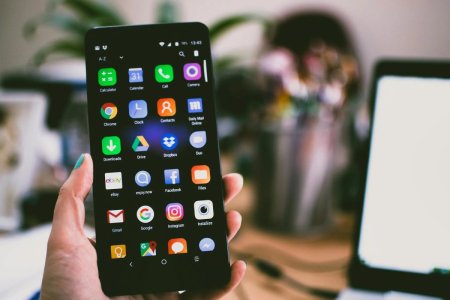Hackers could be tracking you RIGHT NOW through your phone—protect yourself with these essential steps!
By
Veronica E.
- Replies 1
In a world where smartphones have become an essential part of our daily lives, the idea that someone could be tracking your every move can feel unsettling, even invasive. But the reality is, hackers may be doing just that.
With every location you visit, from your local grocery store to your favorite coffee shop, a hacker could be quietly collecting data about your habits and whereabouts.
This can be alarming, especially when considering how much personal information we store on our devices.
Here at The GrayVine, we value your privacy and want to help you safeguard it. Today, we’re taking a closer look at a growing issue that’s been shaking up the digital world: the unauthorized tracking of your phone’s location by hackers.

The Unseen Threat: Hackers and Your Location Data
Imagine someone monitoring your every step, tracking the places you go, and knowing where you’ve been. It’s not a scene from a spy movie—it’s happening in real life.
Recently, 404 Media uncovered a massive breach where hackers stole years of location data from Gravy Analytics, a leading data broker. This isn’t just a small-scale incident; it’s a wake-up call for anyone with a mobile device.
Your phone’s advertising ID, which was designed to help advertisers serve you personalized ads, has become a tool that hackers can exploit.
While it’s meant to anonymize your identity, it’s disturbingly easy for hackers to reverse-engineer this data to identify who you are based on where you've been. Even worse, private investigators and government agencies like the FBI and IRS have been able to buy this data, bypassing the need for a warrant to track people.
A leaked sample from the hackers revealed over 30 million location data points, including visits to private homes, corporate buildings, and even the White House.
If this data were fully released, it could allow real-time tracking of individuals’ movements—a terrifying thought.

Take Control: Limiting Your Location Data Exposure
It may feel like an uphill battle, but there are concrete steps you can take to protect your location data from prying eyes. Here’s how you can take charge of your digital privacy:
For Android Users:
For iPhone Users:
Additional Privacy Shields:
For those of us in the over-60s community, technology has evolved faster than we could have imagined. While the internet and smartphones have brought incredible benefits, they’ve also introduced new risks to our privacy and security.
Staying informed and taking proactive steps to protect your personal data is more important than ever.

Have you taken steps to protect your location data? Do you have any other tips for maintaining privacy in our digital age? We'd love to hear your insights and questions—share them in the comments below!
With every location you visit, from your local grocery store to your favorite coffee shop, a hacker could be quietly collecting data about your habits and whereabouts.
This can be alarming, especially when considering how much personal information we store on our devices.
Here at The GrayVine, we value your privacy and want to help you safeguard it. Today, we’re taking a closer look at a growing issue that’s been shaking up the digital world: the unauthorized tracking of your phone’s location by hackers.

Stay one step ahead: Protect your privacy and safeguard your location data from prying eyes. Image Source: Pexels / Lisa Fotios.
The Unseen Threat: Hackers and Your Location Data
Imagine someone monitoring your every step, tracking the places you go, and knowing where you’ve been. It’s not a scene from a spy movie—it’s happening in real life.
Recently, 404 Media uncovered a massive breach where hackers stole years of location data from Gravy Analytics, a leading data broker. This isn’t just a small-scale incident; it’s a wake-up call for anyone with a mobile device.
Your phone’s advertising ID, which was designed to help advertisers serve you personalized ads, has become a tool that hackers can exploit.
While it’s meant to anonymize your identity, it’s disturbingly easy for hackers to reverse-engineer this data to identify who you are based on where you've been. Even worse, private investigators and government agencies like the FBI and IRS have been able to buy this data, bypassing the need for a warrant to track people.
A leaked sample from the hackers revealed over 30 million location data points, including visits to private homes, corporate buildings, and even the White House.
If this data were fully released, it could allow real-time tracking of individuals’ movements—a terrifying thought.

Take control of your privacy and protect yourself from unauthorized tracking. Image Source: Pexels / Noelle Otto.
Take Control: Limiting Your Location Data Exposure
It may feel like an uphill battle, but there are concrete steps you can take to protect your location data from prying eyes. Here’s how you can take charge of your digital privacy:
For Android Users:
- Go to "Settings" on your device.
- Tap "Privacy" then "Ads."
- Select "Delete advertising ID" to reset your unique identifier.
For iPhone Users:
- Open "Settings" and go to "Privacy."
- Tap "Tracking" and turn off "Allow Apps to Request to Track."
- Under the "Privacy" menu, select "Apple Advertising" and turn off "Personalized Ads."
Additional Privacy Shields:
- Use an ad blocker to prevent trackers from following you online.
- Install a Virtual Private Network (VPN) to mask your internet connection and location from unwanted surveillance.
For those of us in the over-60s community, technology has evolved faster than we could have imagined. While the internet and smartphones have brought incredible benefits, they’ve also introduced new risks to our privacy and security.
Staying informed and taking proactive steps to protect your personal data is more important than ever.
Key Takeaways
- Hackers have claimed to have stolen and leaked cell phone location data from a major data broker known as Gravy Analytics.
- Your cell phone's advertising ID can be used by advertisers to track your activity and personalize offers, but it can also potentially be used to identify and track individuals.
- Government agencies have been known to purchase location data to track people without requiring a warrant.
- To reduce the sharing of your location data, you can delete your advertising ID on Android phones and switch off the "Allow apps to request to track" on iPhones, as well as disable personalized ads. Additionally, using a good ad blocker and VPN can help improve privacy.
Have you taken steps to protect your location data? Do you have any other tips for maintaining privacy in our digital age? We'd love to hear your insights and questions—share them in the comments below!






